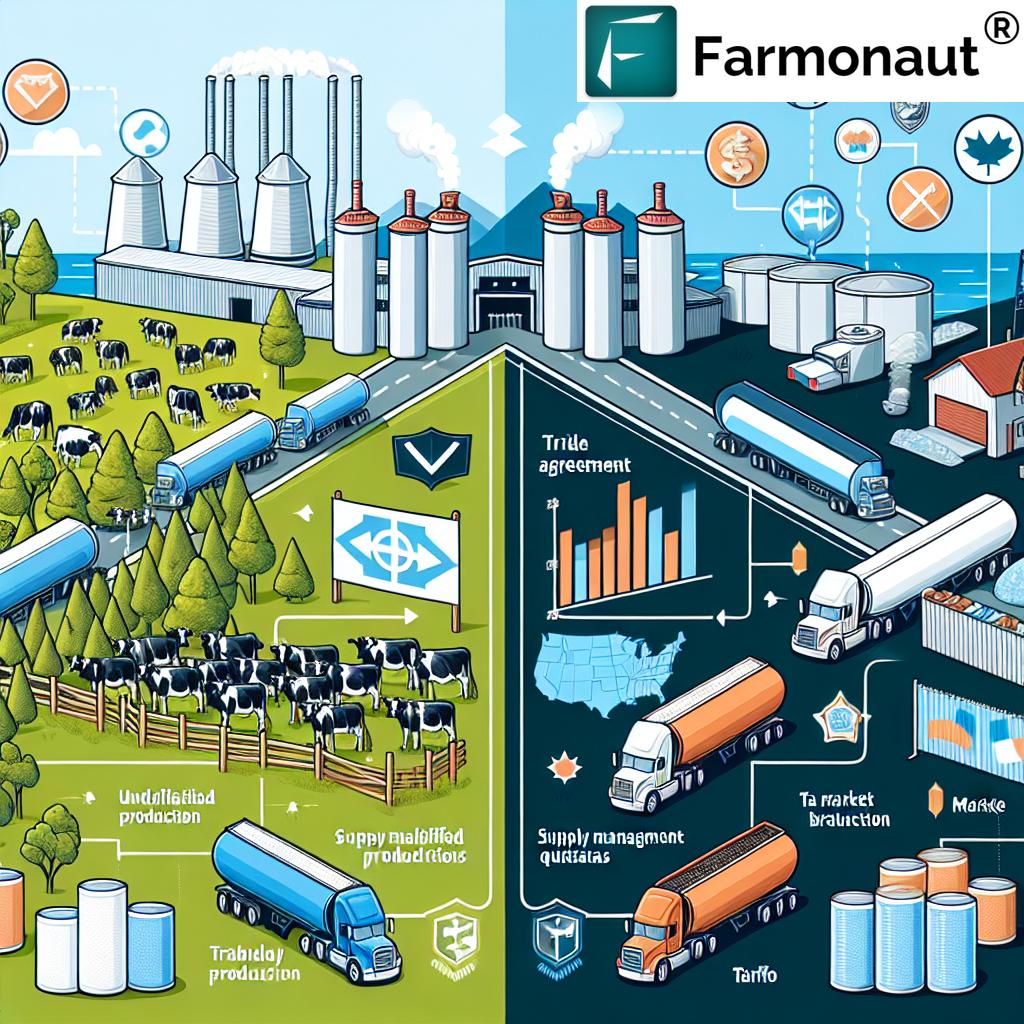Boosting Canada’s Agricultural Future: Youth Employment Program Unlocks Opportunities for Young Canadians
“Canada’s $13.5 million Youth Employment and Skills Program aims to create 1,200 job placements in agriculture.”
In the heart of Ottawa, Ontario, a groundbreaking initiative is set to reshape the landscape of Canadian agriculture. We’re excited to share news about the Youth Employment and Skills Program (YESP), a transformative effort that promises to invigorate the agricultural sector while addressing critical labor challenges. This program, announced by the Honourable Lawrence MacAulay, Minister of Agriculture and Agri-Food, on January 27, 2025, opens doors for young Canadians to embark on rewarding careers in agriculture.

Unveiling the Youth Employment and Skills Program
The YESP represents a significant investment of $13.5 million in Canada’s agricultural future. This initiative aims to create approximately 1,200 job placements, offering invaluable work experience and skills development opportunities for young Canadians. As we delve into the details of this program, it’s clear that its impact will extend far beyond immediate employment, shaping the future of Canadian agriculture for years to come.
Key features of the YESP include:
- Creation of 1,200 job placements in the agricultural sector
- Focus on skills development and practical work experience
- Inclusivity, with special emphasis on indigenous youth participation
- Support for a wide range of eligible applicants, from producers to research facilities
- Prioritization of applications from Indigenous employers for the 2025-2026 program year
This program is not just about creating jobs; it’s about nurturing the next generation of agricultural professionals in Canada. By addressing labor shortages and providing hands-on experience, YESP is set to play a crucial role in ensuring the long-term sustainability and innovation of Canadian agriculture.
Empowering Young Canadians in Agriculture
The Youth Employment and Skills Program is designed to empower young Canadians by providing them with unique opportunities in the agricultural sector. This initiative goes beyond traditional employment programs by offering:
- Diverse Work Experiences: Participants will gain exposure to various aspects of agriculture, from crop production to innovative farming technologies.
- Skill Development: The program focuses on building both technical and soft skills essential for success in modern agriculture.
- Networking Opportunities: Young professionals will connect with industry leaders and potential future employers.
- Career Pathway Exploration: YESP allows participants to explore different career paths within the agricultural sector.
By investing in youth employment in agriculture, Canada is not only addressing immediate labor needs but also securing the future of its agricultural industry. This program aligns perfectly with the growing need for innovative and sustainable farming practices, which are crucial for addressing global food security challenges.
Indigenous Agriculture Opportunities: A Focus on Inclusivity
One of the most commendable aspects of the YESP is its emphasis on creating indigenous agriculture opportunities. By prioritizing applications from Indigenous employers, the program demonstrates a strong commitment to inclusivity and the development of rural and Indigenous communities. This focus is crucial for several reasons:
- It promotes diversity in the agricultural sector
- It helps preserve and integrate traditional agricultural knowledge
- It contributes to economic development in Indigenous communities
- It fosters a more inclusive and representative agricultural workforce
This approach not only benefits Indigenous youth but also enriches the entire Canadian agricultural sector with diverse perspectives and traditional wisdom.
“The program targets young Canadians, including indigenous youth, with eligible applicants ranging from producers to research facilities.”
Addressing Canadian Agricultural Labor Challenges
The agricultural sector in Canada has been facing significant labor challenges in recent years. The YESP is a strategic response to these issues, aiming to bridge the gap between labor demand and supply. Here’s how the program addresses these challenges:
- Targeted Skill Development: By focusing on the specific skills needed in modern agriculture, the program helps create a workforce ready to tackle current and future challenges.
- Attracting Young Talent: The program showcases agriculture as an innovative and rewarding career path, helping to attract young professionals to the sector.
- Long-term Workforce Planning: By investing in youth, the program lays the groundwork for a sustainable agricultural workforce.
- Addressing Rural Labor Shortages: The program encourages young people to consider careers in rural areas, helping to revitalize these communities.
Through these efforts, YESP is not just filling immediate job openings but is also working towards creating a resilient and skilled agricultural workforce for the future.

Eligible Applicants and Program Structure
The YESP casts a wide net in terms of eligible applicants, ensuring that various stakeholders in the agricultural sector can benefit from this initiative. Eligible applicants include:
- Producers and agri-businesses
- Industry associations
- Provincial and territorial governments
- Indigenous organizations
- Research facilities
This diverse range of applicants ensures that young Canadians have access to a broad spectrum of agricultural experiences, from hands-on farming to cutting-edge research and policy development.
The program structure is designed to provide comprehensive support:
- Application Process: Eligible employers submit applications detailing proposed job placements and skill development plans.
- Selection: Applications are reviewed with a focus on creating diverse and meaningful opportunities, with priority given to Indigenous employers.
- Placement: Selected young Canadians are matched with employers based on their interests and the needs of the agricultural sector.
- Mentorship and Training: Participants receive ongoing support, mentorship, and training throughout their placement.
- Evaluation: Regular assessments ensure the program meets its objectives and provides value to both participants and employers.
This structured approach ensures that the YESP delivers tangible benefits to all stakeholders involved.
Impact on Canada’s Agricultural Economy
The YESP is poised to have a significant impact on Canada’s agricultural economy. By investing in youth employment and skills development, the program contributes to:
- Economic Growth: Introducing fresh talent and innovation into the sector stimulates economic activity.
- Increased Productivity: A skilled workforce leads to more efficient and productive agricultural operations.
- Rural Development: The program encourages youth to pursue careers in rural areas, supporting the revitalization of these communities.
- Innovation and Sustainability: Young professionals bring new ideas and a focus on sustainable practices, driving industry innovation.
- Global Competitiveness: A robust and skilled agricultural workforce enhances Canada’s position in the global agricultural market.
The ripple effects of this investment in youth and agriculture are expected to benefit not only the sector but the broader Canadian economy as well.
Agricultural Skills Development: Preparing for the Future
One of the core objectives of the YESP is to foster agricultural skills development among young Canadians. This focus on skills is crucial in an era where agriculture is rapidly evolving, driven by technological advancements and changing environmental conditions. The program emphasizes:
- Technical Skills: Training in modern agricultural techniques, equipment operation, and precision farming technologies.
- Digital Literacy: Developing competencies in agricultural software, data analysis, and digital farm management tools.
- Sustainable Practices: Education on environmentally friendly farming methods and resource management.
- Business Acumen: Building skills in farm management, marketing, and agricultural economics.
- Soft Skills: Enhancing communication, problem-solving, and leadership abilities essential for success in the agricultural sector.
By focusing on these key areas, the YESP ensures that participants are well-equipped to face the challenges and opportunities of modern agriculture.
For those interested in exploring innovative agricultural technologies, Farmonaut’s web application offers cutting-edge solutions for precision farming and crop monitoring.
Long-term Benefits for Canadian Agriculture
The Youth Employment and Skills Program is not just a short-term solution to current labor challenges; it’s an investment in the long-term future of Canadian agriculture. Some of the anticipated long-term benefits include:
- Sustainable Workforce: Creating a pipeline of skilled professionals to support the agricultural sector for years to come.
- Innovation and Adaptation: Infusing the industry with fresh perspectives and ideas, driving innovation and adaptability.
- Enhanced Food Security: Building a robust agricultural workforce contributes to Canada’s food security and self-sufficiency.
- Rural Community Revitalization: Encouraging young people to pursue careers in agriculture helps sustain and revitalize rural communities.
- Improved Industry Image: Showcasing agriculture as a modern, technologically advanced sector attracts more talent in the long run.
These long-term benefits underscore the strategic importance of the YESP in shaping the future of Canadian agriculture.
Collaboration and Partnerships
The success of the Youth Employment and Skills Program relies heavily on collaboration between various stakeholders in the agricultural sector. This collaborative approach involves:
- Government Agencies: Coordination between federal, provincial, and territorial governments to ensure comprehensive support.
- Educational Institutions: Partnerships with colleges and universities to align educational programs with industry needs.
- Industry Associations: Involvement of agricultural associations to provide insights into sector-specific requirements and opportunities.
- Research Facilities: Collaboration with research institutions to expose participants to cutting-edge agricultural technologies and practices.
- Indigenous Organizations: Engagement with Indigenous groups to ensure culturally appropriate and relevant program elements.
This collaborative framework ensures that the YESP remains responsive to the evolving needs of the agricultural sector and provides meaningful opportunities for young Canadians.
For agricultural businesses looking to leverage technology in their operations, Farmonaut’s API offers powerful tools for integrating satellite data and advanced analytics.
Measuring Success and Program Evaluation
To ensure the effectiveness of the Youth Employment and Skills Program, a robust system of evaluation and measurement is crucial. Key metrics and evaluation methods include:
- Job Placement Rates: Tracking the number of successful job placements and their duration.
- Skill Acquisition: Assessing the skills gained by participants through surveys and performance evaluations.
- Employer Satisfaction: Gathering feedback from participating employers on the program’s impact and the performance of placed individuals.
- Long-term Career Tracking: Following up with participants to monitor their career progression in agriculture.
- Economic Impact Assessment: Evaluating the broader economic benefits to the agricultural sector and rural communities.
Regular reviews and adjustments based on these evaluations will ensure that the YESP continues to meet its objectives and adapts to the changing needs of the agricultural sector.
Youth Employment and Skills Program (YESP) Impact on Canadian Agriculture
| Program Features | Estimated Impact | Long-term Benefits |
|---|---|---|
| Investment Amount | $13.5 million | Sustainable funding for agricultural workforce development |
| Job Placements Created | ~1,200 new job placements | Addressing labor shortages in agriculture |
| Target Demographics | Young Canadians, including indigenous youth | Diverse and inclusive agricultural workforce |
| Eligible Applicants | Producers, agri-businesses, research facilities, etc. | Broad industry participation and knowledge transfer |
| Focus Areas | Skills development, work experience, indigenous participation | Fostering innovation and sustainability in the agricultural sector |
The Role of Technology in Modern Agriculture
As we discuss the future of Canadian agriculture and the opportunities provided by the YESP, it’s crucial to highlight the role of technology in shaping the industry. Modern agricultural practices increasingly rely on advanced technologies to improve efficiency, sustainability, and productivity. Young professionals entering the field through programs like YESP will need to be familiar with these technologies:
- Precision Agriculture: Using GPS, sensors, and data analytics to optimize crop management.
- Drone Technology: For crop monitoring, mapping, and even precision application of inputs.
- IoT in Agriculture: Internet of Things devices for real-time monitoring of crops, soil, and equipment.
- AI and Machine Learning: For predictive analytics in crop yield, pest management, and resource allocation.
- Blockchain: For improving traceability and transparency in the agricultural supply chain.
Companies like Farmonaut are at the forefront of this technological revolution in agriculture. Their satellite-based farm management solutions offer valuable tools for modern farmers and agribusinesses.
For those interested in exploring these technologies, Farmonaut’s API Developer Docs provide insights into integrating advanced agricultural data into various applications.
Challenges and Opportunities
While the Youth Employment and Skills Program presents numerous opportunities, it’s important to acknowledge and address potential challenges:
- Rural-Urban Divide: Attracting youth to rural agricultural jobs may be challenging due to urbanization trends.
- Technological Adaptation: Ensuring that all participants have equal access to and understanding of new agricultural technologies.
- Retention: Encouraging long-term careers in agriculture beyond the initial program period.
- Balancing Traditional and Modern Practices: Integrating new technologies while respecting traditional agricultural knowledge.
- Climate Change Adaptation: Preparing young professionals to tackle the challenges posed by changing climate patterns.
Addressing these challenges head-on will be crucial for the long-term success of the YESP and the broader goal of revitalizing Canadian agriculture.
The Future of Canadian Agriculture
As we look to the future, the Youth Employment and Skills Program stands as a beacon of progress and innovation in Canadian agriculture. By investing in young talent, fostering skills development, and embracing technological advancements, Canada is positioning itself as a leader in sustainable and efficient agricultural practices.
The future of Canadian agriculture, shaped by initiatives like YESP, promises:
- A tech-savvy and highly skilled agricultural workforce
- Increased adoption of sustainable and environmentally friendly farming practices
- Greater food security and self-sufficiency for Canada
- Enhanced global competitiveness in agricultural markets
- Revitalized rural communities with thriving agricultural sectors
As this program unfolds, it will be exciting to see how it transforms the landscape of Canadian agriculture, creating a more resilient, innovative, and sustainable industry for generations to come.
For those looking to be part of this agricultural revolution, Farmonaut offers innovative solutions accessible through their Android app and iOS app.
Conclusion
The Youth Employment and Skills Program represents a significant step forward for Canadian agriculture. By investing in young talent, fostering skills development, and embracing technological advancements, Canada is not only addressing current labor challenges but also laying the groundwork for a thriving agricultural future.
As we’ve explored throughout this article, the YESP offers numerous benefits:
- Creating valuable job opportunities for young Canadians
- Addressing labor shortages in the agricultural sector
- Promoting inclusivity and diversity in agriculture
- Fostering innovation and sustainability in farming practices
- Contributing to the long-term growth and competitiveness of Canadian agriculture
The success of this program will depend on the continued collaboration between government agencies, educational institutions, industry partners, and innovative companies like Farmonaut that are driving technological advancements in agriculture.
As we look to the future, it’s clear that initiatives like the YESP are crucial for ensuring that Canadian agriculture remains at the forefront of global innovation and sustainability. By empowering young Canadians with the skills, knowledge, and opportunities they need to succeed in agriculture, we are not just securing the future of the industry, but also contributing to a more sustainable and food-secure world.
FAQs
- Q: Who is eligible to apply for the Youth Employment and Skills Program?
A: Young Canadians, including indigenous youth, are eligible. Employers such as producers, agri-businesses, industry associations, provincial and territorial governments, Indigenous organizations, and research facilities can apply to host participants. - Q: How long do the job placements last under the YESP?
A: The duration of job placements can vary, but they typically range from a few months to a full year, depending on the specific opportunity and employer needs. - Q: What types of skills can participants expect to develop through this program?
A: Participants can expect to develop a range of skills including technical agricultural skills, digital literacy, sustainable farming practices, business management, and essential soft skills like communication and leadership. - Q: Is there a focus on specific agricultural sectors within the YESP?
A: The YESP covers a broad spectrum of agricultural sectors, from crop and livestock production to agricultural technology and research, aiming to provide diverse experiences across the industry. - Q: How does the program support Indigenous participation in agriculture?
A: The YESP prioritizes applications from Indigenous employers and focuses on creating opportunities for Indigenous youth, promoting inclusivity and the integration of traditional agricultural knowledge.
Earn With Farmonaut: Affiliate Program
Earn 20% recurring commission with Farmonaut’s affiliate program by sharing your promo code and helping farmers save 10%. Onboard 10 Elite farmers monthly to earn a minimum of $148,000 annually—start now and grow your income!













